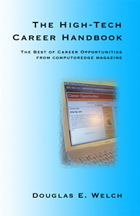Beware the
pundit
April 1, 2005
** Listen to this column
on your computer, iPod or other audio player **
Listen | Listen (Backup)
If you enjoyed this podcast, please
Vote
for Career-Op on Podcast Alley

I am sure you have seen this before. A new technology is announced and
it takes only moments before writers across the globe start to predict
its demise. There is a rush to discount the new technology in a hundred
different ways, explaining, in great detail, exactly when and why it will
never work. I wish I had such foresight. Imagine the riches that would
follow if you were able to know these things with such certainty. Of course,
as you already know, most pundits are wrong most of the time. This is
one major reason I steer clear of such “pile-ons”. I would
much rather help people find the technologies that work for then instead
of worrying about those that may, or may not, fail.
The Will Rogers Effect
I am sure some folks would describe me as the Will Rogers of technology.
Supposedly, I have never met a technology I didn’t like. This is
untrue, of course. There are plenty of technologies I utterly despise
and never recommend to my clients. The truth is, I simply practice the
ancient rule, “if you can’t say something nice, don’t
say anything at all.”
Unless a technology is damaging or dangerous in some way, I am not going
to go out of my way to complain about it. If the technology is horribly
flawed, it will fail all on its own, without any help from me. In many
cases, though, the technology is simply directed at a very small market
segment. Some pundits take this to mean that the technology itself is
flawed. I would beg to differ. If a piece of technology helps even one
client be more productive and profitable, then it is worth something.
The real truth is, all technologies need time to find their legs and their
markets. An early shaming by pundits can drive out good technologies before
they have a chance to prove their worth. You need to be aware of this
whenever you read a review or an article. Just because version 1.0 didn’t
have every feature under the sun, doesn’t mean it won’t grow
into something wonderful down the road.
Note the bias
Whenever you are seeking advice from anyone regarding technology (as with
anything else in life), you need to be aware of any bias that might be
coloring their comments. Despite the efforts to make Mac and Windows computers
co-exist peacefully, some people are still fighting that battle. Ask a
Windows user about an Apple technology and you are likely to hear a screed.
Of course, it also works the other way around. Ask a Mac user about Windows
and the screed will be just as harsh. Make sure you are directing your
questions to the appropriate people.
In the same way, make sure you are reading the appropriate columns, articles
and magazines for your questions. Many columnists have clear preferences
in their technology and you need to take this into account. This doesn’t
mean you ignore the harsh words about a technology, only that you consider
the source. A columnist might bring up excellent points in their dismissal
of technology, even if those points don’t add up to the same conclusion
for you. Think of technology articles as movie reviews. Perhaps the writer
complains about the slow pace of the film, but you happen to like slower-paced
movies. This could be a perfect film for you, if you consider the source
and their, probably, well-known bias.
The Eeyore
Of course, there are some technology pundits out there who fall into the
“Eeyore” category. They delight in trashing every new technology
as it appears. Why do they do this? No one knows for sure, but perhaps
they gain some personal or professional validation when a technology does
fail. It is simply a matter of odds that more products will fail then
succeed, so predicting failure is naturally going to net you more success
in your predictions. This can make it seem as if they have a finger on
the pulse of the tech community, even though they are playing the right
odds. Personally, I would be more impressed by someone who could tell
me what products will succeed. That would certainly be more useful.
Perform your reading and research with a critical eye. Understand the
bias in every article or column you read and you will gain a better understanding
of technology and the technology market. Don’t let pundits blindly
lead you down a path. Make sure that you find out for yourself. A successful
high-tech career requires getting the input of others, but also applying
your own experience and intelligence to any technology decision.
|

Now
Available from CafePress.com
<%=INSERTTEXT%>
|